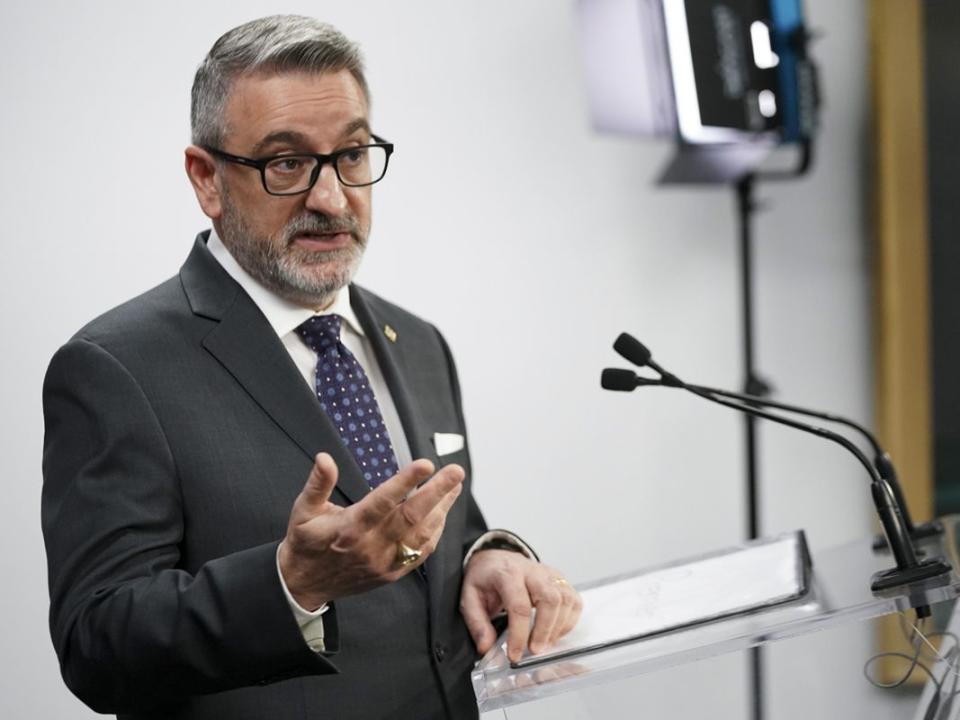William Watson: Common sense in language policy is 'where numbers warrant'

There was a lovely story from The Canadian Press in yesterday’s Post about two Ontario politicians getting together over breakfast recently to invent another feel-good collective right — and, it would appear, at least a six-figure budget line to go along with it. It concerns Ontario government house leader Paul Calandra and Sol Mamakwa, NDP member of the provincial legislature for Kiiwetinoong, a giant riding in northwestern Ontario, which incidentally has only a third the population of the average Ontario riding.
It seems Calandra, best known to Canadians outside Ontario for his tearful apology for providing evasive answers in the House of Commons in 2014 while serving as parliamentary secretary to Prime Minister Stephen Harper, was annoyed by Mamakwa complaining at a Queen’s Park reception that he wasn’t allowed to speak his language in the legislature.
When his staff informed him that was true — only English and French were allowed in the legislature (a basic parliamentary fact a government house leader really should know) — Calandra became even more annoyed and now the rule is English, French “or an Indigenous language spoken in Canada.” On being elected, new members will inform the clerk of the legislative assembly of Ontario which language they intend to use and the clerk will arrange for translation.
The existing rule was “just wrong,” CP quotes Calandra as saying. “It just seemed like this is common sense and I can’t believe that we don’t actually allow it to happen.”
The new rule may be many things — a lovely gesture, a continuing apology, a woke token of respect and welcome — but the one thing it definitely is not is common sense. Statistics Canada’s latest numbers show that in 2021 just over one in 10 First Nations people living in Ontario could speak an Indigenous language. Only 6,165 could speak Mamakwa’s language — Anishininiimowin or (its settler, i.e., English name) Oji-Cree. And that was down 15 per cent from just five years earlier.
In 2021, Ontario’s population was 14,223,942, which means the legislature is now going to provide simultaneous translation for a language spoken by one in every 2,307 Ontarians.
This is a great new rule for translators and for the union workers who do renovations in the Ontario legislature — since it seems the translation space will have to be redesigned and expanded — but it is not a great rule for anyone else. And you know the effect will spread: Prime Minister Justin Trudeau isn’t going to let Ontario Premier Doug Ford, of all people, out-do him in political gesturing.
One of the great achievements of Pierre Trudeau, Justin’s father, carrying through on Lester Pearson’s initiative, was the Official Languages Act, which confirmed that English and French were the official languages of Canada and that the federal government had to provide services in both. But that right, later largely enshrined in Pierre Trudeau’s other great legacy, the Charter of Rights and Freedoms, came with a common-sense qualifier: “where numbers warrant.” Services will be provided in the minority language where numbers warrant.
There have been many disputes over the years, including court cases, over just how big the numbers have to be to warrant this or that. But cost and inconvenience were clearly part of the common-sense equation. Not any more, it seems.
For those of us who came of political age in Canada in the 1960s, bilingualism, biculturalism, Trudeaumania, reconciliation with Quebec and openness to French were all very exciting (especially, I concede, for English Montrealers). Across the country parents of good will enrolled their kids in French immersion. When Quebec responded with a separatist government in 1976 and referenda on independence in 1980 and 1995, enthusiasm waned, to say the least.
But now Marc Tanguay, interim leader of the Quebec Liberal party (currently running at six per cent in the polls), seems smitten with the B&B spirit of the ’60s. He wants the Canada of 2050 to be a place where half of us can speak French — at the moment just under 30 per cent can — and to that end he wants Ottawa to source more immigrants from French-speaking places.
Great, you’re probably thinking, another expensive, unrealistic 2050 target. Seats in Quebec are always a concern for any federal party hoping to form a government but my guess is that outside Quebec popular support for a new bilingualism push is below net-zero — especially with the current Quebec government and the separatist party leading it in the polls gradually tightening restrictions on the province’s English-speakers (who number, in terms of home-users, more than 850,000 people, almost four times the number of Indigenous-Canadians who can speak a First Nations language well enough to carry on a conversation).
At Confederation, Quebec’s population was just less than a third of Canada’s. It’s now just over a fifth. Quebec currently seems less enthusiastic about immigrants — French or English — than the rest of the country does. If actual immigration reflects that, how long before the rest of the country decides Quebec’s numbers as a share of Canada’s population no longer warrant the country’s bilingual/bicultural political superstructure?
Financial Post
Bookmark our website and support our journalism: Don’t miss the business news you need to know — add financialpost.com to your bookmarks and sign up for our newsletters here.

 Yahoo Finance
Yahoo Finance 